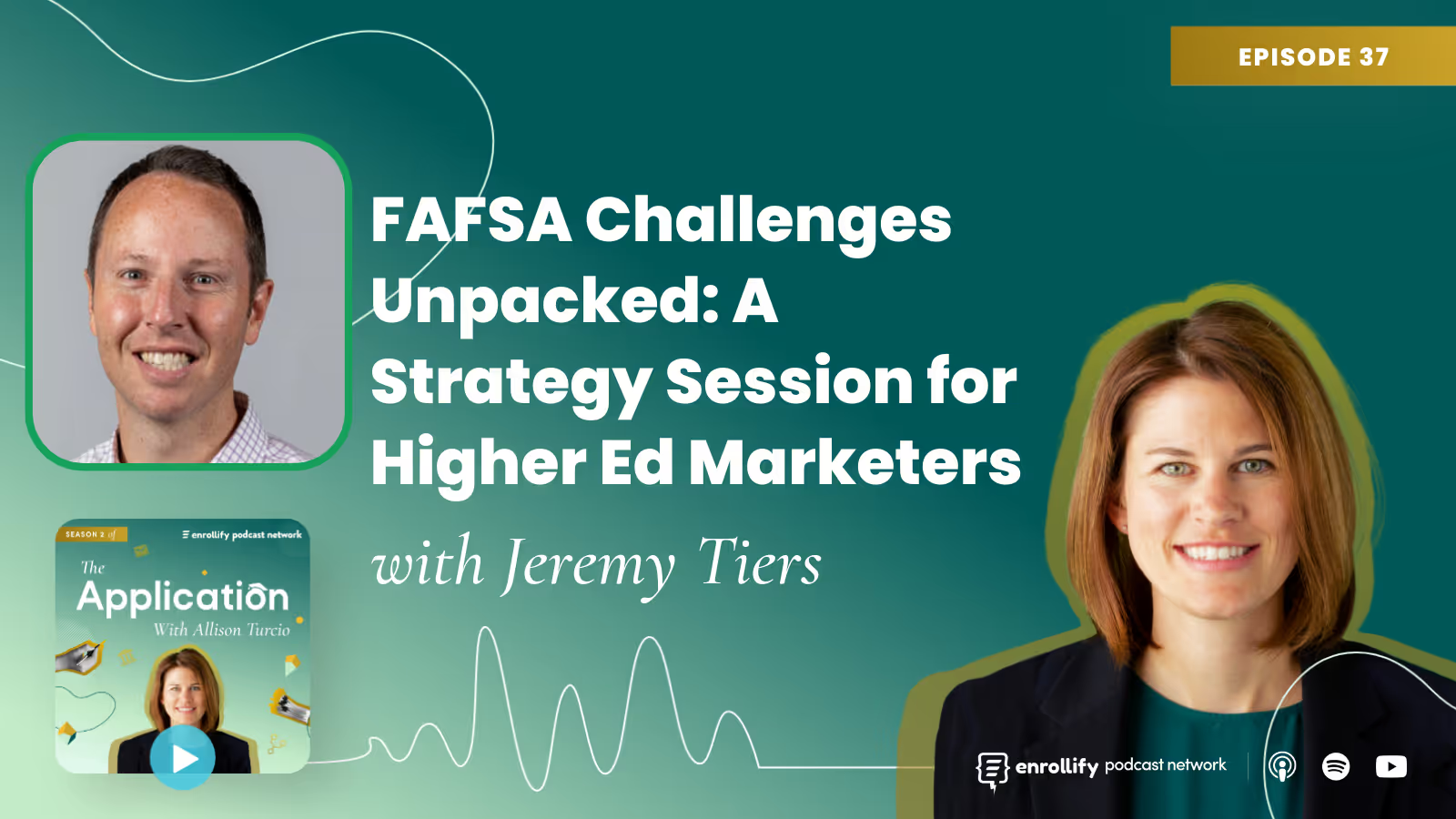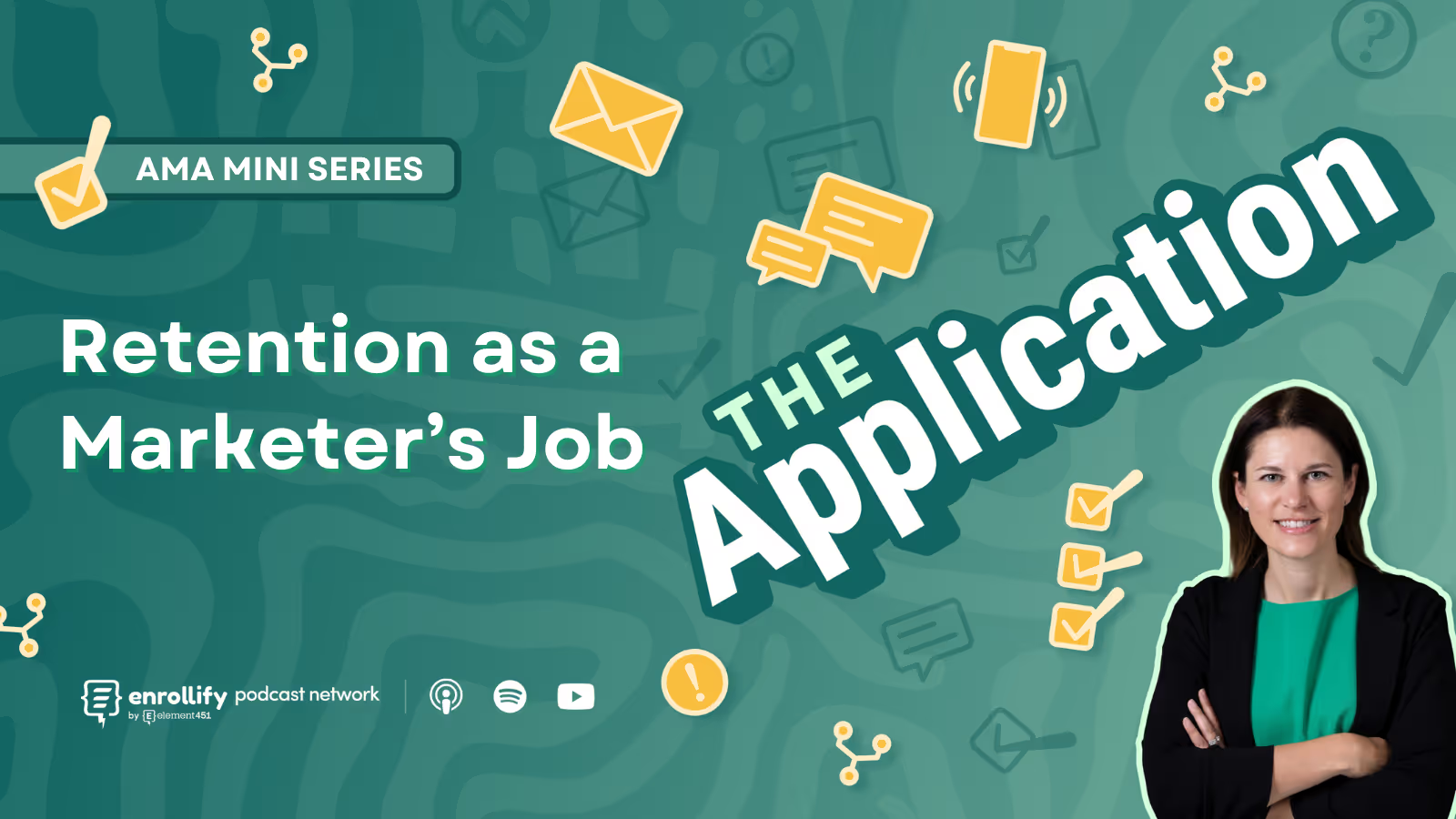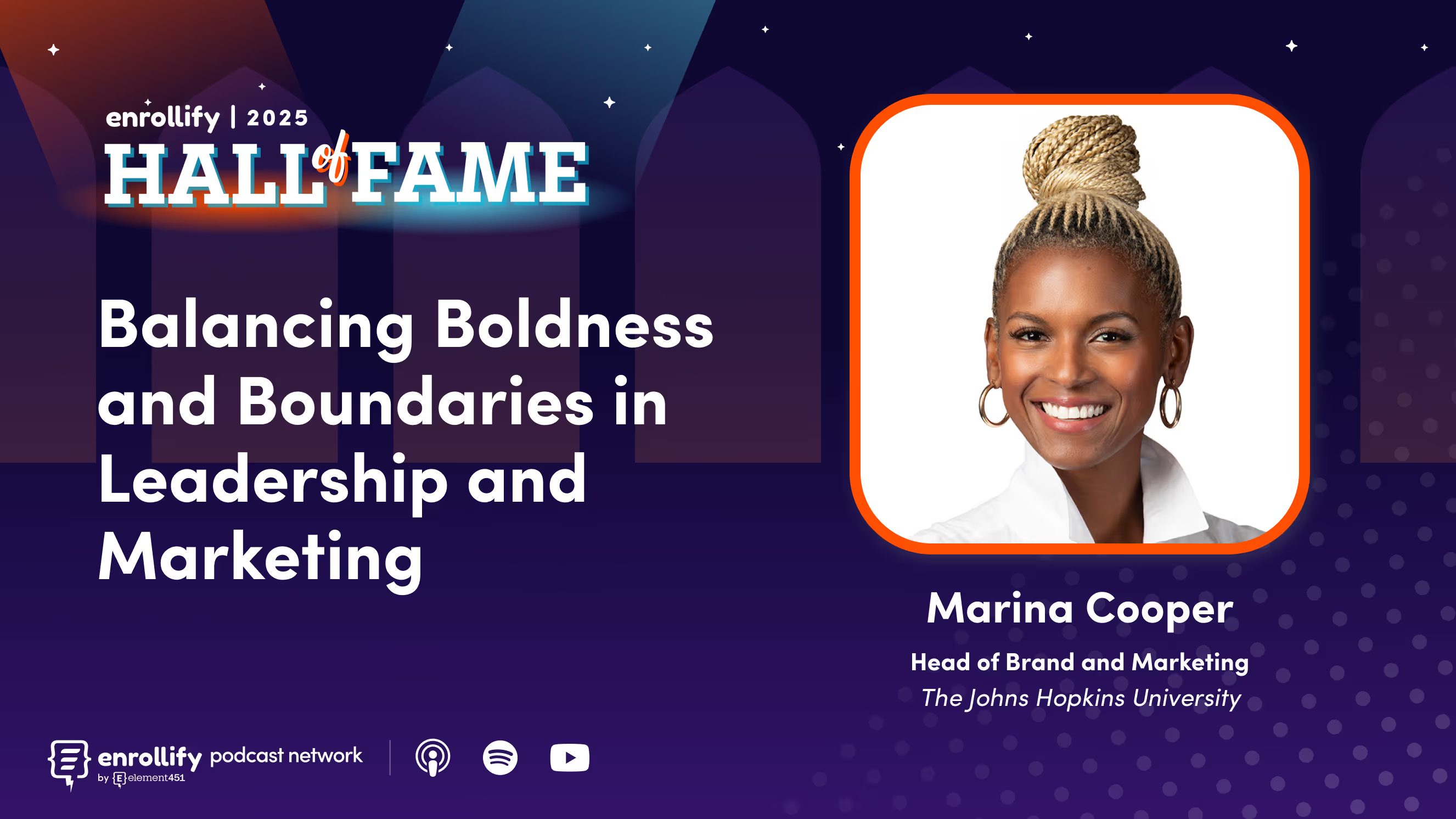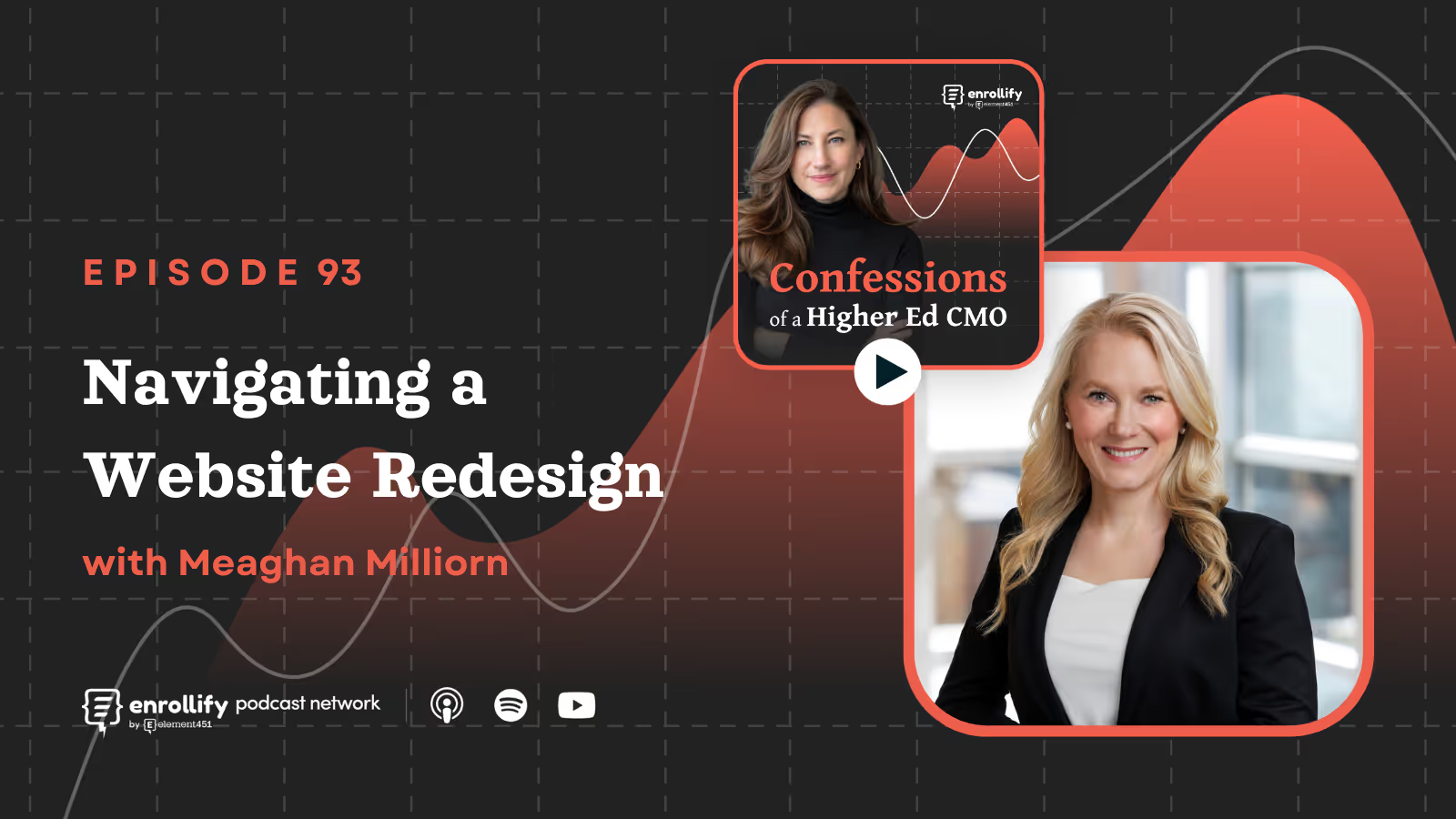About the Episode
About the Episode: In this special crossover episode, Allison Turcio and fellow Enrollify podcast host Jeremy Tiers dive deep into the complexities that FAFSA delays pose for higher education, with a special focus on the role of marketers in navigating these challenges. They emphasize the critical need for synergy among marketing, admissions, and financial aid teams, highlighting how a unified approach can significantly mitigate the impacts of these delays. The conversation is geared towards equipping higher education marketers with strategies for crafting empathetic and engaging communications, aimed at reducing the stress and uncertainty faced by students and families. Don’t miss their insights on the importance of understanding the unique concerns of each family, and how to create messaging that resonates and builds trust. Tune in to discover how you, as a higher education marketer, can play a pivotal role in helping your institution rise to the challenge of the delayed FAFSA.
Understanding the Challenge
The financial aid process, notably the Free Application for Federal Student Aid (FAFSA), is notoriously complex and stressful for students and families. This complexity has been exacerbated by delays and technical issues, further inflating the anxiety and frustration experienced by applicants.
These challenges, while seemingly bureaucratic, have profound implications for students' access to education and institutions' ability to enroll and support them.
The Impact on Students and Families: The delays and glitches in the FAFSA process add significant stress to an already daunting task. For many families, navigating financial aid is their first foray into higher education bureaucracy.
When these processes stall, it not only delays their financial planning but also casts a shadow of uncertainty over their entire college decision-making process. Students and families find themselves navigating a maze of requirements, with every glitch and delay amplifying their anxiety about the future.
The Ripple Effect on Institutions: For colleges and universities, FAFSA delays translate into a cascade of operational challenges. Admissions and financial aid departments, already stretched thin, must manage increased inquiries and concerns from anxious families while also adjusting their timelines and strategies to account for the delays.
This situation strains resources and tests the agility and resilience of these teams, highlighting the necessity of cross-departmental communication and collaboration to navigate these turbulent times effectively.
Supporting Financial Aid
Marketing teams in higher education institutions play a pivotal role in alleviating some of the pressure faced by financial aid offices. By adopting a proactive and supportive approach, marketers can help streamline the information flow and reduce anxiety for students and families.
Streamlining Communication: Clear, concise, and empathetic communication can demystify the financial aid process for families.
Marketing teams can develop targeted campaigns that explain the steps of the FAFSA process, common issues, and how to address them, and timelines for receiving financial aid packages.
By preemptively addressing these topics, institutions can reduce the volume of inquiries to financial aid offices, allowing those teams to focus on processing applications and supporting students with specific needs.
Educational Content and Resources: Creating educational content that guides families through the financial aid process—not just FAFSA but also scholarships, loans, and budgeting for college—can empower them to make informed decisions.
Webinars, FAQs, and step-by-step guides can serve as valuable resources, reducing the knowledge gap and building trust between the institution and its prospective students and families.
Communicating with Empathy for Yield
In the context of yield—converting admitted students into enrolled ones—communication strategy must pivot towards empathy and personalization. Understanding that each family's situation and concerns are unique is crucial in crafting messages that resonate and reassure.
Personalization and Direct Engagement: Tailoring communications to address the specific concerns and questions of students and parents can make a significant difference. This might involve segmenting audiences based on their interests, questions, or concerns and developing targeted messages that speak directly to those points.
Engagement should not be limited to digital communications; phone calls and virtual meetings can add a personal touch that emails and texts cannot match.
Building a Community of Support: Institutions can facilitate forums, social media groups, or virtual meetups where prospective students and families can share their experiences and tips.
These platforms can offer additional support and foster a sense of community among prospective students, helping them feel more connected to the institution and each other.
Ongoing Support Beyond Acceptance: Communicating with empathy means recognizing the journey doesn't end at acceptance.
Continuous support and engagement throughout the decision-making process, summer melt period, and into enrollment are critical for maintaining trust and ensuring students feel confident in their choice to attend.
By addressing these areas with thoughtful strategies and genuine empathy, higher education marketers can significantly impact their institutions' ability to navigate FAFSA challenges, support financial aid processes, and improve yield rates.
This holistic approach not only aids in immediate operational challenges but also builds a foundation of trust and support that benefits the institution and its students in the long run.
Key Takeaways:
- Understand the Impact: Recognize the challenges FAFSA delays pose to both students and institutions.
- Support Colleagues: Collaborate across departments to streamline the financial aid process for families.
- Communicate with Empathy: Engage prospective students and their families with meaningful, empathetic communication to facilitate their decision-making process.
About the Show: The Application is your playbook for the ever-evolving world of higher education enrollment marketing. This podcast zeroes in on the niche, often-unexplored areas of the field, delivering a potent mix of actionable insights, practical strategies, and cutting-edge perspectives.
Connect With Our Host:
Allison Turcio
https://www.linkedin.com/in/allisonturcio/
https://twitter.com/allisonturcio
About The Enrollify Podcast Network:
The Application with Allison Turcio is a part of the Enrollify Podcast Network. If you like this podcast, chances are you’ll like other Enrollify shows, too!
Some of our favorites include Mission Admissions and Visionary Voices: The College President’s Playbook.
Enrollify is made possible by Element451 — the next-generation AI student engagement platform helping institutions create meaningful and personalized interactions with students. Learn more at element451.com.
Connect with Us at the Engage Summit:
Exciting news — Allison will be at the 2024 Engage Summit in Raleigh, NC, on June 25 and 26, and we’d love to meet you there! Sessions will focus on cutting-edge AI applications that are reshaping student outreach, enhancing staff productivity, and offering deep insights into ROI.
Use the discount code Enrollify50 at checkout, and you can register for just $99! This early bird pricing lasts until March 31.
Learn more and register at engage.element451.com — we can’t wait to see you there!















